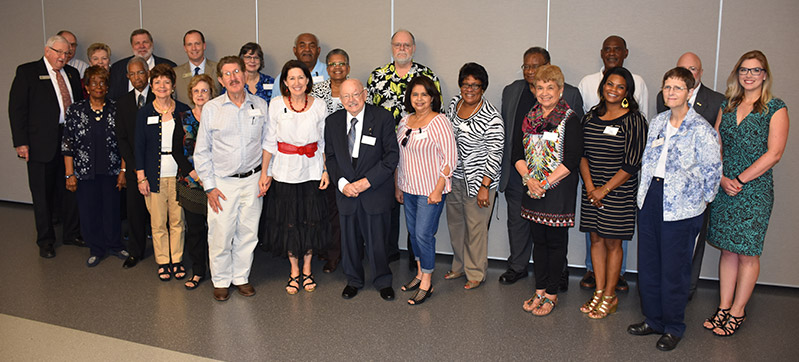Original faculty member returns for UHV Homecoming

The University of Houston-Victoria welcomed back one of its first faculty members in addition to 14 other retired faculty and staff as part of its 2017 Homecoming celebration.
Robert Zawadzki was one of the original 25 UHV faculty members when the university opened in 1973. He retired in 2000 and has stayed involved in the university’s growth and development.
“I have a deep love for Victoria and UHV,” he said. “I like being around people who have goals and work to become educated, so they can make themselves and the world better. I am excited to see UHV’s plans for the future and how it is impacting our community.”
During the luncheon, returning faculty and staff members and their guests watched a presentation by UHV President Vic Morgan about the university’s plans for expansion. Morgan discussed the plan to break ground April 11 on the new University Commons building as well as plans for the Town Plaza Mall that UHV is in the process of purchasing and changes to Ben Wilson Street.
“This is an exciting time for UHV, and we want to share these updates with the people who helped make this progress possible,” said Jesse Pisors, UHV vice president for advancement and external relations. “We are grateful for all their contributions to UHV through the years, and it’s wonderful to see them come back and continue to support the university.”
Before coming to Victoria, Zawadzki was finishing his doctorate at the University of Pittsburgh. One day in April 1973, he came home from work and had to shovel several inches of snow from his driveway, he said.
“I came inside and told my wife that I wanted to live somewhere warm,” Zawadzki said. “I found an opening in Victoria with the opportunity to be part of an original faculty and build a school and program from scratch, and I jumped at the chance.”
Zawadzki started working at UHV on July 13, 1973, teaching the graduate course “Introduction to Special Education.” During his time at UHV, he was part of the special education and education administration graduate programs faculty.
He published several research articles regarding working with handicapped children. He also published books, including “Practical Science: Lessons and Experiments,” “Light and Sound,” and “What If? … Alternatives to Despair.”
“Over time, the majority of the superintendents, principals and administrators in the area became graduates of UHV’s program,” he said. “Almost all of the special education teachers were trained at UHV, and there were a lot of wonderful people at the university who made that possible.”
When he retired in 2000, the university honored him by collecting money to create a scholarship in his name. Zawadzki decided to take the gift further by raising enough for it to become an endowed scholarship for graduate students studying special education. The Bob and Lee Zawadzki Endowed Scholarship was created.
“I love the people – all the faculty, staff, administrators and students – at UHV,” Zawadzki said. “This university allows its faculty members the latitude to grow and become what they desire, which is a key to excellence. I am grateful for the welcoming, accepting attitude I received from UHV and the community. This is a place of excellence.”
The University of Houston-Victoria, located in the heart of the Coastal Bend region since 1973 in Victoria, Texas, offers courses leading to more than 80 academic programs in the schools of Arts & Sciences; Business Administration; and Education, Health Professions & Human Development. UHV provides face-to-face classes at its Victoria campus, as well as an instructional site in Katy, Texas, and online classes that students can take from anywhere. UHV supports the American Association of State Colleges and Universities Opportunities for All initiative to increase awareness about state colleges and universities and the important role they have in providing a high-quality and accessible education to an increasingly diverse student population, as well as contributing to regional and state economic development.
Lauren Hightower-Emerson
361-570-4342






